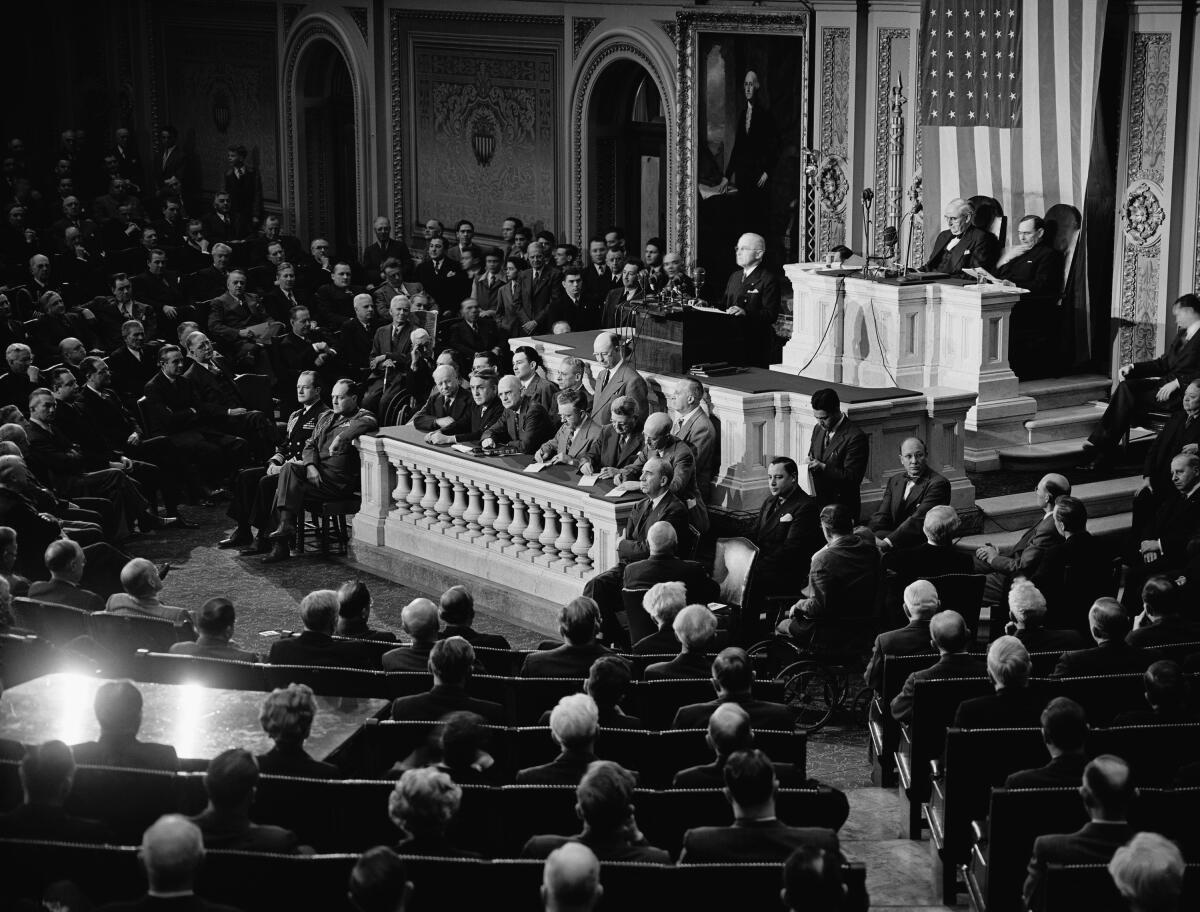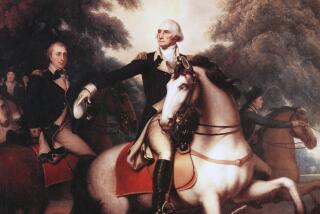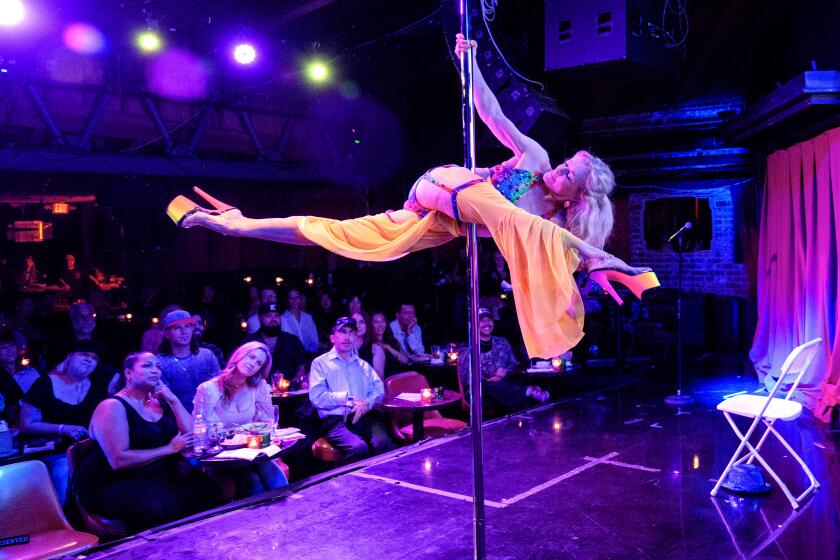Truman and Coolidge go up, Jefferson and Jackson go down. How history remembers presidents

INDEPENDENCE, Mo. — When Harry Truman left office in 1953, he moved back here to his Kansas City-area hometown with the lowest poll numbers in recorded history. People weren’t just mild about Harry, they were downright done with Harry.
But Truman, a master of aphorisms if not the political arts, sometimes comforted himself with a phrase that was as prescient as it was palliative: “Do your best, history will do the rest.”
Truman has indeed done well by history. The 33rd president, once barely possessing the approval of 2 in 5 Americans, today consistently ranks among the top U.S. presidents, his lack of lyrical eloquence now regarded as pure American lack of pretension.
But Truman is not the only chief executive whose fortunes have changed markedly — some dramatically up, some precipitously down — since leaving office.
A generation ago, Dwight D. Eisenhower was regarded as little more than the genial golfer in the White House; today he is considered as formidable a presence as president as he was as the military leader who led the Allies to victory in World War II.
Then again, a generation ago, Thomas Jefferson was seen as a sentinel of democracy and Andrew Jackson as the quintessential American man of the people; today one is derided as a hypocrite on race and the other pilloried as an intemperate warrior bent on the genocide of Native Americans.
The presidents’ passage — some from global giants to unremarkable place holders — exemplifies a curious aspect of history that affects presidents and the times they occupied: The past is constantly changing.
“People look back at a historical era and see it differently,” said Pulitzer Prize-winning historian Doris Kearns Goodwin, “often because we change the definition of what quality and character are all about.”
Indeed, the way we remember things often says more about the present than the past. “We use history to understand our own world, and we look at presidents through the window of today,” said Renee Romano, an Oberlin College expert on memory in history. “If we see in presidents something that was acceptable in his time but not acceptable today, his reputation goes down. And some presidents’ reputations go up.”
The personal crudity that some Americans identify in President Trump, for example, prompted many of them — even ardent Democrats who opposed and perhaps ridiculed George H.W. Bush in office — to see heroic elements in the character of the 41st president when he died in November.
Much of the impetus has come from scholarly and, often even more so, popular books. Through bestselling biographies, David McCullough has single-handedly revived the reputations of Truman (president, 1945-1953) and John Adams (1797-1801), both overshadowed by their formidable predecessors, Franklin Delano Roosevelt and George Washington.
“I felt these two presidents had been overlooked, and that each deserved far more credit and gratitude than they had received,” McCullough said. “One of the things I hope my work does is to help us all further appreciate what some of these more admirable but ignored characters achieved against what was very often stiff adversity. As different as Adams and Truman were, they exemplified coming up from modest or even primitive backgrounds.”
The “plain folks” wisdom ascribed to Truman is at odds with a contemporary, dismissive assessment of a then young Democratic congressman. “I never had the feeling that I needed Truman,” said Rep. John F. Kennedy of Massachusetts.
But quietly, with little notice outside Independence, the rehabilitation of Truman was gathering force during Kennedy’s brief presidency (1961-1963). In 1962, writer Merle Miller began interviewing Truman for a television series that the networks shunned but which ended up providing raw material for Miller’s 1973 oral biography of Truman, “Plain Speaking.” Popular with the public but criticized by historians for factual errors —Truman’s memory and the historical record didn’t always jibe — the book set in motion the Truman revival.
That revival accelerated two years later when James Whitmore began touring with a one-man play called “Give ‘Em Hell, Harry,” which has enjoyed a minor rebirth with Truman’s grandson, Clifton Truman Daniel, in the title role. “While playing Grandpa,” he said, “I realized why he keeps making a comeback.”
::
Rating presidents has long been an American obsession. British historians are not as preoccupied, for example, with ranking English kings, but American scholars, pollsters and even presidents have been constantly ranking American chief executives.
John Adams once described Washington as “Old Muttonhead.” Lincoln considered James K. Polk a “bewildered, confounded and miserably perplexed man.” Woodrow Wilson deemed Chester A. Arthur “a nonentity with side whiskers.”
The first serious ranking effort came with Arthur M. Schlesinger Sr.’s survey of 55 historians in 1948. That poll placed Lincoln, Washington and Franklin Roosevelt in the top three spots, and, with slight variations of the order in which they appear, those three have remained at the top through our own time.
The latest comprehensive poll, conducted among 91 historians and authors by C-SPAN in 2017, placed Lincoln first.
“These three are the gold standard of presidents, and have remained so for decades,” said Shirley Anne Warshaw, a Gettysburg College historian who was surveyed in the C-SPAN poll. “We judge all other presidents against the standard they set.”
The 1948 Schlesinger survey placed Wilson, Jefferson and Jackson in the next three positions, but all three have declined as the decades passed.
Schlesinger repeated his survey in 1962, a year after Eisenhower left office. At that time, Eisenhower was in the “Low Average” category, as the 22nd best president (out of 34). When the Wall Street Journal polled 82 historians in 2005, Eisenhower had climbed to eighth place. Since then there have been a handful of major Eisenhower biographies, each more heroic than the last.
Hardly anyone praised Lyndon B. Johnson (1963-1969) at his departure from the White House at the end of the tumultuous 1960s, but today — on domestic affairs, though not on Vietnam — he is experiencing a robust revival, with a series of academic and popular books praising his legislative achievements, especially in civil rights.
“Johnson’s reputation has changed dramatically,” said Goodwin, who as a young woman helped Johnson write his memoir. “All those Great Society programs for the poor and about health were taken for granted for years, and though Vietnam will always be a stain on Johnson, people now appreciate that so much of the social fabric of the country dates to him.”
Meanwhile, two relatively recent Republican presidents have enjoyed rehabilitation.
“When they left office, George H.W. Bush and Gerald Ford were viewed very differently than they are today,” said Roger Porter, who teaches a course on the presidency at Harvard. “We have had the opportunity many decades after to see what they did in context. When you look at what went before and then what followed, you have a much clearer picture.”
In the 2013 Gallup Poll, 3 of 5 Americans ranked Ronald Reagan either “outstanding” or “above average,” giving him the second-highest ranking of presidents since the Eisenhower years, rating just below Kennedy.
And now — suddenly — the two Adams presidents, John and John Quincy (1825-1829), have more favor than ever before.
The father was the beneficiary of the McCullough biography, and the son has been rehabilitated in part because of his post-presidential career in the House of Representatives, where he became a prominent opponent to slavery, and because of his 1841 defense, before the Supreme Court, of captive Africans from the ship Amistad, arguing that they were free men illegally sold into slavery.
Ulysses S. Grant presents a vital historical case study in presidential assessment.
For generations, American historians regarded Grant (1869-1877) as a disastrous leader who presided over a feast of corruption. Schlesinger’s 1948 assessment had him just above Warren G. Harding (1921-1923) as an abject failure. By 2005, the Wall Street Journal survey placed Grant in the “Below Average” category, between Richard M. Nixon (1969-1974) and Ford.
Today, after a series of fawning biographies, including William S. McFeely’s Pulitzer Prize winner and Ron Chernow’s 2017 blockbuster, Grant almost certainly ranks well above average. Upon his death, his close friend Mark Twain, who had supervised Grant’s memoir, expressed frustration that the former president had not addressed questions of his fondness for alcohol. “I would have said to General Grant, ‘Put the drunkenness in the Memoirs — & the repentance & reform. Trust the people.’”
That is a precursor to Truman’s conviction that history would take care of itself.
“History doesn’t stand still,” said Robert W. Merry, author of “Where They Stand,” a comprehensive account of presidential assessments. “The contemporary view of any historical period is subject to changes based on changing attitudes and outlooks about today.”
Presidential rankings also fluctuate with the nature of the rankers themselves. Merry points out that Democrats outnumbered Republicans 2 to 1 in the Schlesinger surveys, and Alvin Felzenberg, a presidential historian affiliated with the Annenberg School for Communication at the University of Pennsylvania, has identified a liberal bias in the rankings.
“I can understand why that is,” Felzenberg said. “Academics tend to be liberals, and the people writing history now were educated in university during Vietnam, the civil rights movement and the environmental revolution. But every now and then we discover new things, and presidents like Eisenhower benefit.”
And sometimes historians make new discoveries, or the times prompt new evaluations, that undermine presidents’ reputations, which is why many state Democratic parties no longer call their annual winter fundraising functions the Jefferson-Jackson Day Dinner.
“The vote today,” Andy McGuire, the Iowa Democratic Party chairman, said three years ago when the party abandoned the Jefferson-Jackson name, “confirms that our party believes it is important to change the name of the dinner to align with the values of our modern-day Democratic Party: inclusiveness, diversity and equality.”
One impetus was the fact that Jefferson (1801-1809) and Jackson (1829-1837) were slaveholders. Jefferson has come under searing reevaluation since historian Annette Gordon-Reed’s “The Hemingses of Monticello: An American Family,” which won the 2009 Pulitzer Prize, illuminated Jefferson’s relationship with Sally Hemings, his slave mistress.
“I think after the Hemings revelations, some people began to see Jefferson more as a human being rather than as a symbol,” said Gordon-Reed. “His entanglement with slavery seemed even more real for many. There’s no way to deny the importance of slavery at Monticello when we understand the nature of his relations with members of the Hemings family.”
Three days before last year’s Fourth of July celebrations marking the Declaration of Independence that Jefferson wrote, the City Council in his home city of Charlottesville, Va., voted to cease celebrating his April 13 birthday as a holiday. Instead, it established a holiday for March 3, the date in 1865 when, a month before the end of the Civil War, Union forces arrived in Charlottesville and freed the city’s slaves.
::
Two presidents in the first quarter of the last century present a contrast that illuminates the fluctuation in presidential reputations.
Wilson (1913-1921) was once regarded as a visionary leader, so much so that Paris renamed its Avenue du Trocadero as the Avenue du President Wilson. During roughly the same period, Calvin Coolidge (1923-1929) was ridiculed as a taciturn simpleton, a notion he buttressed by saying, “I think the American people want a solemn ass as a president. And I think I’ll go along with them.”
Neither assessment holds today.
Wilson left office in sadness and repudiation, broken physically and emotionally after returning from post-World War I peace treaty negotiations in Paris to a hostile Republican Congress that would frustrate his dream of creating a League of Nations.
Even so, international efforts in the ensuing decades reflected Wilson’s vision, such as the creation of the United Nations, the World Bank and the North Atlantic Treaty Organization.
Kennedy’s vow in his 1961 inaugural address to “meet any hardship, support any friend, oppose any foe, in order to assure the survival and the success of liberty” can be regarded as Wilsonianism translated into a 1960s idiom.
And yet by the early 21st century, Wilson was out of favor, his segregationist instincts widely repudiated, with “Wilsonian” becoming a discredited synonym for promoting democracy abroad and supporting free trade in a world of new economic rivalries.
“In a way, everybody has been debating Wilson for years,” said Patricia O’Toole, a Columbia University historian and Wilson biographer. “He was the touchstone for all these debates, and now he has declined because of the race issue. He seems way out of sync right now.”
Then there is Coolidge. Amity Shlaes, a serial revisionist who has questioned the reputation of FDR, portrayed “Silent Cal” in a 2013 biography as a thoughtful, reflective and innovative president.
“He was a good economist and he promulgated far better politics than he was given credit for,” Shlaes said. “He was treated as though he was someone who presided over a false, champagne-bubble economy, but in fact presided over a rock-solid economy whose achievements ought to be admired today.”
All of which raises the question of how future historians might regard President Trump, whose disapproval ratings have consistently outpaced his approval ratings.
His hope: That, as with the cases of Coolidge, Grant, Truman and Lyndon Johnson, contemporary criticisms might wear away and his achievements — in the economy, perhaps — might stand the test of historians.
Trump has upended almost all of the conventions of the presidency. He retains the ability of upending the reputations of the presidents as well. Trump’s coarseness boosted the public esteem of George H.W. Bush, but will it soften liberals’ criticism of Bush’s son, George W. Bush (2001-2009), who sometimes was dismissed as shallow?
“Presidents, for better or worse, are how we recall our country,” Shlaes said. “They are avatars, symbols and vessels. They also are revelatory. When a policy is condemned, the president who promulgated that policy is condemned. It may not do justice to either the figure or the president. But with new technology and new ways to get information, we can look past the secondary literature and go deeper than we used to be able to go.”
And by going deeper, we see differently. And by doing so, we in the present change our past.
“Truman used to say that you have to wait at least 50 years for the dust to settle,” McCullough said. “How true, how true.”
Shribman is a special correspondent.
More to Read
Sign up for Essential California
The most important California stories and recommendations in your inbox every morning.
You may occasionally receive promotional content from the Los Angeles Times.








